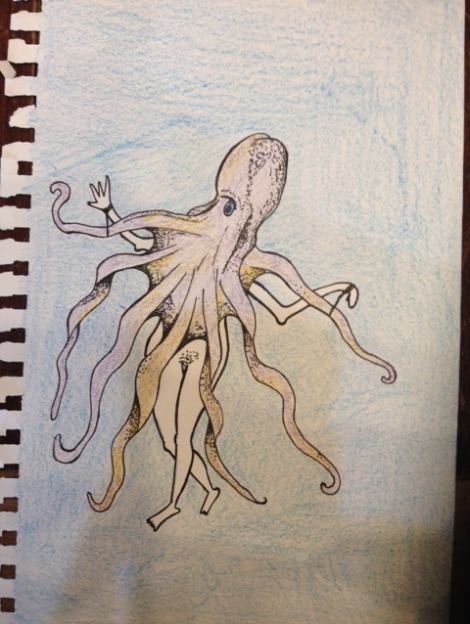The Contrarian.
March 7, 2015
The contrarian is delighted by opportunities to express her visceral revulsion. Anything can, in its turn, be the subject of a polemic. We have known the contrarian to defend something one day and despise it the next; she alternately dismisses or adores. But should this tendency be mistaken for naïve irresolution, let me reassure you: there is nothing she will find objectively worthy of approval. It’s not within the objects themselves that she finds value but in the act of judgment, especially the expression of disapproval. For the contrarian, the performance of good taste lies solely in the critical and vehement expression of distaste. She’s in good company. We can trace this orientation back to Kant, and further even, to Renaissance court society. Thus the contrarian, though known for the fervor of her opinions, has never had a thought before others have spoken.
8-legged lingerie
February 28, 2014
Bored in a concert hall
October 22, 2013
In the silences held between movements of a great orchestral sonata, audience members catch themselves pondering at length their own personal foibles, partially completed to-do lists, minor work and/or relationship blunders, desire to go home and watch a movie, and impending Lasik eye surgery – they can’t believe they’re actually gonna let some quackjob burn through their eyeballs with a laser. One fellow laughed out loud, remembering that that very afternoon he had momentarily fretted that the book he was reading would run out of battery life.
I am probably overreacting
August 4, 2013
(start of a novel about an egoistic scholar who gets his comeuppance)
I was traveling by train from DC to Boston when my bag went missing. The bag contained the following artifacts:
- An in-progress piece of scholarship that, when finished, will be of great value to the world.
- A copy of Anton Webern’s collected songs (no longer in print), which were gifted to me by an admirer.
- Several journals and notepads containing personal scribblings and musings, clearly of no use to anyone but myself and possibly a future biographer.
- A stranger’s phone number, acquired at a favorite bookstore in the nation’s capital.
- My lunch, which I was saving until I could not stand the glorious anticipation one more instant. I shall not divulge what that lunch was, in order to maintain an air of mystery about my day-to-day worldings.
Let it be known that the pain of finding my bag (and lunch) missing was dreadful.
I can only assume a rabid fan of mine has run off with the bag. I have suspicions: a certain young man caught my eye first as I boarded and again, in passing, as I crossed to the café car. I do not know what it is about me that demands an instantaneous idée fixe. Perhaps it is my air of disapprobation, which no doubt stirs childish longing for validation.
Perhaps now he is reading my journals, stealing my ideas, and munching on my meticulously prepared mid-day meal while feeling himself filling with eminence.
Perhaps he’ll even call the stranger, how hilarious that would be! The stranger, expecting me to arrive at their door, finds instead a kleptomaniac with no attention for detail carrying a bouquet of stolen anecdotes. Ha!
The Character and Controversy of Elmer Sorro, Composer
April 5, 2013
In a wild act of plagiarism, composer Elmer Sorro cut passages from his favorite pieces and made a new piece, a composite piece, with the clips rearranged in a nightmarish mutation of their progenitors. Stitched into their new context, the bits and pieces of other, more famous composers were warped, rotated, and amplified. Only after his death did anyone begin to notice.
They are not the notes of the Great Elmer Sorro!
Did he do this intentionally or was it a mistake?
Is he a genius or an idiot?
The scholars felt personally violated; Sorro had defiled their convictions.
And they rejoiced; there was much to discuss!
The theorists examined the form.
The biographers examined the history.
The pious, the virtue.
The artists, the affect.
The philosophers, the ontology.
The philistines, huh?
Listeners bemoaned the death of their darling;
they listened to it again to mourn it properly;
they listened a third time and savored their fury;
and they listened a fourth time in a Grand Personal Renaissance.
The publishers shook their heads.
The students wrung their hands.
The children barely noticed.
The friends discussed it by candlelight.
The graduate students scrambled to pick the winning side and publish.
Sorro’s editor was thankfully long-past; his protégé more prolific than ever; his lover still rolling his eyes.
And by some truly stray arrangement of time, space, and ether this blatant intellectual piracy was deemed an act of brilliance. Bravissimo!
